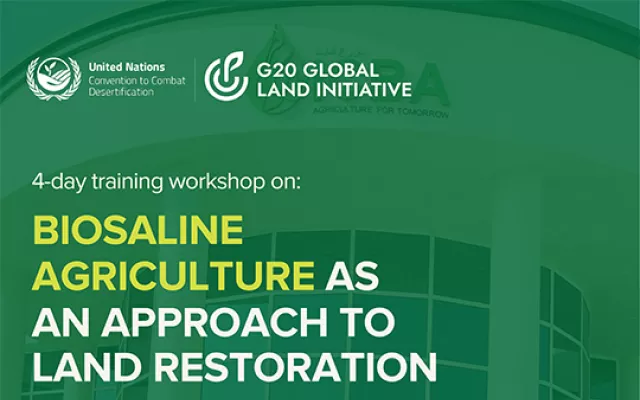Tamkeen program paves the way for young Arab women leaders
8 March 2017
Today is the International Women’s Day and the theme for this year is “Women in the Changing World of Work: Planet 50-50 by 2030”. It looks at how to accelerate the United Nations 2030 Agenda, building momentum for the effective implementation of the new Sustainable Development Goals, especially goal number 5: Achieve gender equality and empower all women and girls; and number 4: Ensure inclusive and quality education for all and promote lifelong learning.
The United Nations Secretary-General Mr. António Guterres said “I am 100% committed women's leadership and gender equality. We can’t achieve any of our goals without the participation of women and girls".
At the International Center for Biosaline Agriculture (ICBA), the day reminds us about the significance of Young Arab Women Scientists Leadership (Tamkeen) Program - the first of its kind in the MENA region, which was launched by the Center last year.
Dr. Ismahane Elouafi, Director General of ICBA said, ““Women in the world deserve to be applauded and supported by the whole system, from her own Family to the whole local, regional and international community. In general, Women tend to work hard for the sake of their families and loved ones. They require opportunities to help them improve their skills and subsequently improve their lives. That’s what we had in mind, as we develop various programs targeting women”
Funded by the Islamic Development Bank (IsDB) and the Bill & Melinda Gates Foundation, Tamkeen program was launched to build and improve skills and capacities of a new generation of young Arab women scientists and leaders, contributing to the UN Sustainable Development Goal on gender equality and women’s empowerment.
The design phase laid the groundwork for the program and recently the first deliverables of the program, three reports, that lay the foundation for the full-fledged program, were published. The reports focused on: capacity building programs review; Arab women scientists in agriculture: characteristics, challenges and perspectives; andeducation, scientific research & development and agriculture academic programs in MENA.
The reports not only highlighted the challenges that MENA region faces in education and research and development sectors, but also shows opportunities and the significant advances that MENA region has made in furthering women’s leadership.
The challenges range from the political, socio-economic all the way to quality challenges impacting curriculum, faculty, systems and infrastructure and student skills. Legacy education systems built around memorization and focus on theory versus practical application have produced scores of entrants to the labor market who are not job-ready and are perhaps even less ready to assume jobs within the scientific research and development field that requires creative problem solving and critical thinking skills.
Challenges impacting the growth of the research and development sector in the MENA region include a weak research and development culture generally, a lack of deep awareness of the impact of research and development on the growth of economies and well-being of communities, weak funding and investment in research and development initiatives and a weak curriculum, faculty and student quality that eventually impacts not only the quantity, but also the quality of research produced from the region.
The findings show that within the scientific research and development sector, the MENA region still has a long way to go in comparison to more successful models within the wider MENA region – for example Turkey and Iran – and an even longer path towards catching up with more developed nations in the West and their accomplishments within the field.
Despite these considerable challenges, the report has captured several opportunities that present the region with a catalyst for future growth in the field of scientific research and development. The region is witnessing an increased focus by governments towards investments in education, evident through several countries’ higher allocation of GDP investment towards education initiatives. The same is happening with regards to GDP investment in research and development, albeit to a lesser degree.
Additionally, several countries in the MENA region have shown considerable growth in the number of citable scientific documents published and the MENA region’s share of the world output of scientific publication is indeed increasing.
Some of the most critical aspects identified by women scientists interviewed for the findings report include:
- Providing them with the tools to build their leadership and science skills through various channels of structured and applied learning
- Offering them opportunities of attachments with international research centers of excellence
- Providing a platform to build networks and relationships with national, regional and international counterparts
- Offering a more long-term approach to learning and development to ensure learning and application has ample and sufficient time to be both acquired and practiced
- Provide opportunities to access information and tools needed to acquire funding for research projects and to access fellowship opportunities
- Developing partnerships with other regional institutions to raise awareness about organizational gender dynamics, shift attitudes and raise peer skills
Arab Women scientists in the region have tremendous potential and a diversity of skills, knowledge and values. This potential and diversity presents an exciting opportunity for the region, as well as for the scientific community globally.
The MENA region is definitely on the cusp of a development wave and its most pressing challenge will be to identify and activate initiatives and measures to ensure both growth and sustainability of this envisioned development that is staring to take shape.
On 23-27 April 2017, ICBA will launch and host a five-day pilot leadership training program for about 12 Arab women, representing 10 Arab counties to pave way for future training programs for young Arab women researchers. The program will target around 60 women annually, so that each women gets a chance to participate in 10 leadership trainings - personally or virtually.
ICBA is well positioned to play a pioneering role in both aiding growth and creating sustainable mechanisms to drive this growth for the region for the years ahead.










